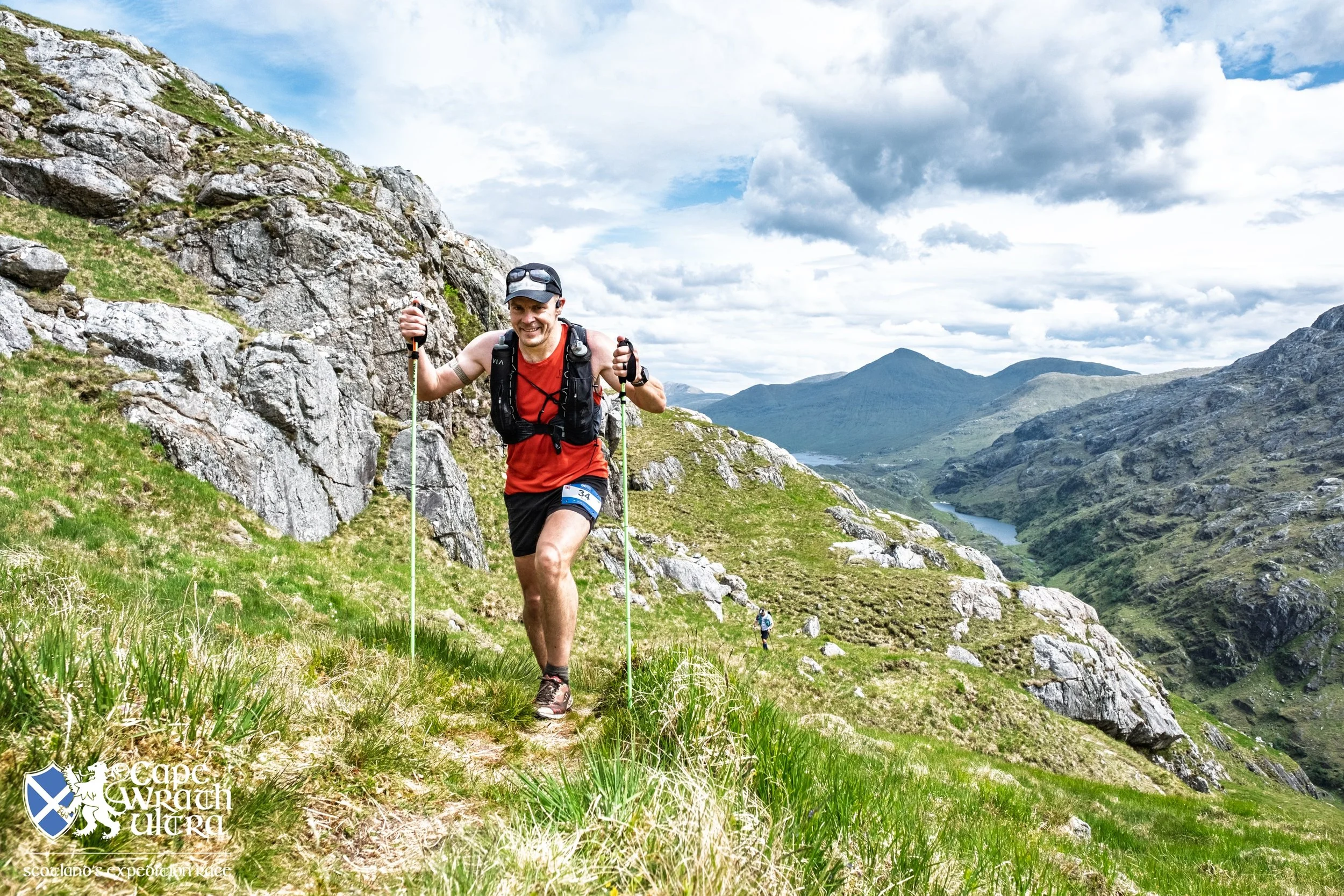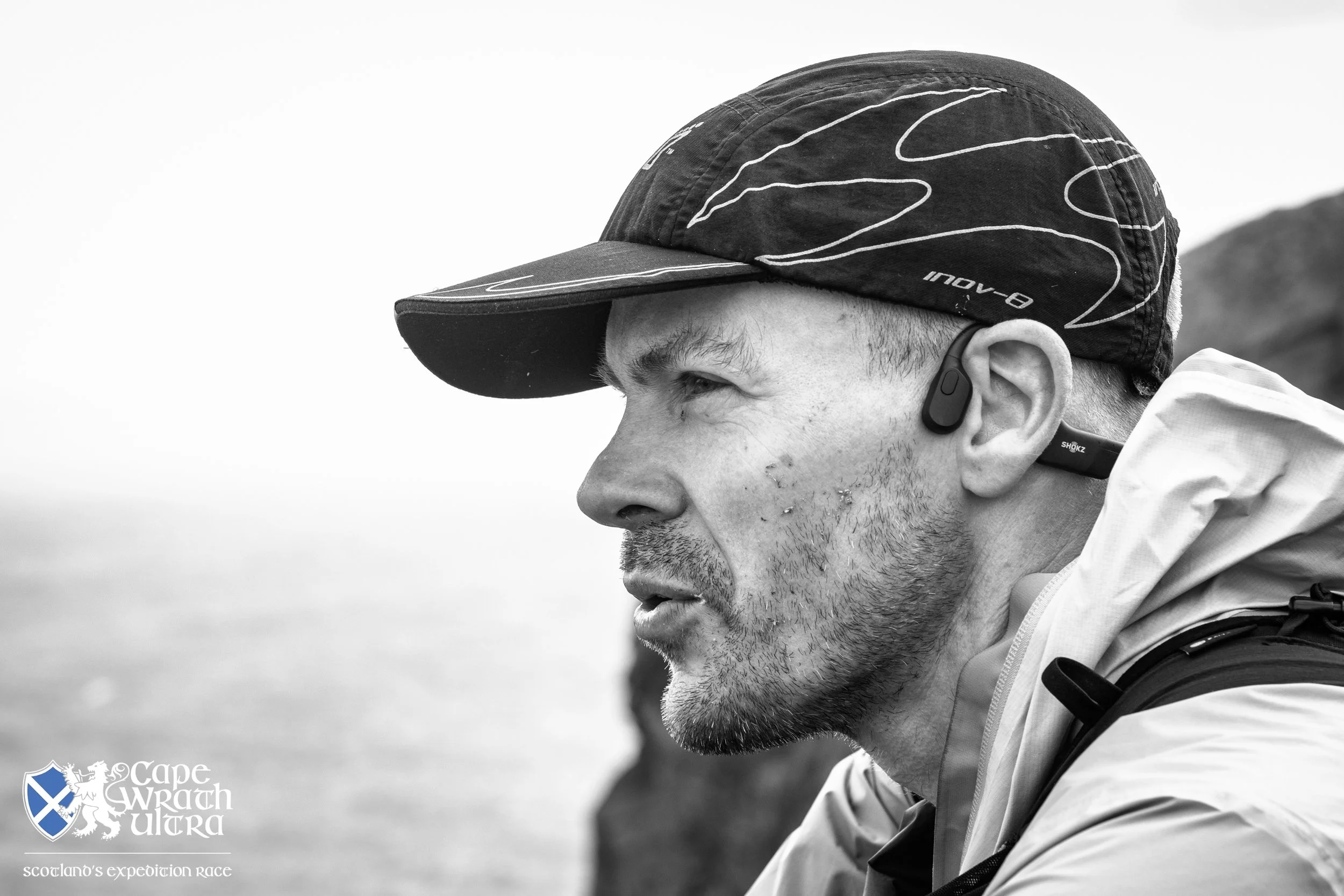Rich Cross
Mental Training for Cape Wrath Ultra
It had been a few years since I'd run any kind of ultramarathon, I'd never attempted a multi-day stage race, and I was turning 50 just after Cape Wrath Ultra. Would my body hold up to eight consecutive days of running? How would I handle the exhaustion, discomfort, and sleep deprivation? What about the mental challenges - living in close quarters with strangers, missing my family, dealing with setbacks when they inevitably arose? What if I was just not having any fun at all?
These questions swirled through my mind as I prepared for the Cape Wrath Ultra. While reading about Shane Ohly's Dragon's Back Race experience, I came across a mention of Fit-Think and their work with ultra runners: an approach that treated the mental side of endurance racing as seriously as the physical. I reached out to Vicky Begg, one of their sport psychology therapists, and we began working together several months before my race.
Setting the Goal: Performance vs Holiday
My initial session with Vicky began with simple questions: "What motivates you? Why do you want to do this?". These questions led to deeper exploration about what I really wanted from the experience. Was the Cape Wrath Ultra going to be a 'running holiday' where I aimed primarily to enjoy myself, take in the scenery, and simply finish? Or was I going to push for the best performance I could manage, even at the risk of overdoing it and potentially not finishing?
I decided to push for a competitive finish rather than just aiming to complete the distance. As Vicky helped me understand, what motivates me is what would sustain me through both training and racing. A vague goal of "just finishing" wouldn't drive me to put in the necessary work. Having a concrete target gave me something tangible to work toward - ambitious enough to require real commitment but realistic given my abilities and the time I could dedicate to training.
Exploring the bounds of Knoydart ©Reuben Tabner Photography
Preparing to Perform
One of our key sessions explored when and why I produce my best performances. What conditions help me thrive? When do I struggle? We identified the key factors present in good performances versus poor ones - things like having clear structure, feeling prepared, and knowing what to expect. The biggest revelation: having a plan was crucial to my success. Not a rigid minute-by-minute schedule, but a framework for approaching each day, dealing with problems, and maintaining momentum. Without this structure, I'd drift into reactive mode, making poor decisions when tired. We also used performance profiling to identify where to focus my training efforts. This tool helped me assess my strengths and weaknesses across different aspects of ultra running - from physical capabilities to mental skills to practical race admin. Rather than trying to improve everything, I could target the areas that would give the biggest return on investment.
For me, this meant less time worrying about already-strong areas like basic fitness, and more time on weaker spots like organisation, sleep, and mental strategies for tough patches. It also highlighted that race admin - the mundane but crucial tasks of managing kit and camp routines - deserved as much attention as hill repeats. This focused approach to training, both physical and mental, meant I arrived at the start line feeling as prepared as possible, rather than just hoping for the best.
Managing Pre-Race Anxiety
One of the most useful tools Vicky taught me was how to sort out my worries. As someone who tends to overthink before big events, this made a big difference.
The system was elegantly simple:
• Hypothetical worries ("What if the weather is terrible all week?" "What if I get swallowed whole by a bog?") - acknowledge them, then mentally file them away
• Practical worries ("Have I tested my nutrition?" "Do I have the right gear?") - make a plan and do something about them
This framework helped enormously during race week. Instead of lying awake running through every disaster scenario, I could sort my worries and deal with them properly. Hypothetical ones got noted and then parked. Practical ones got addressed with specific actions.
The Power of Self-Compassion
The biggest shift in my mental approach was learning to be kind to myself: self-compassion. This wasn't about making excuses or lowering standards - it was about changing how I reacted when things went wrong. My inner voice during races had always been my own worst enemy. Not brutal, but definitely not helpful. Every wrong turn or bad decision would set off a stream of negative self-talk. I learned to treat myself like I'd treat a good friend - with understanding and encouragement rather than criticism. Leaving camp on Day 4 with three minutes to spare and no hill food would previously have left me angry at myself; instead, I could almost laugh about it - "Not your finest hour, Rich" - and redirect my energy towards problem solving (an energy gel and small malt loaf left in my bag from Day 3 got me through!). This self-compassion extended to physical struggles too. When my feet started protesting with blisters from Day 3, I didn't add mental suffering to physical pain by telling myself I should have trained more, chosen different shoes, or been tougher. I simply acknowledged the discomfort and dealt with it as best I could.
©Reuben Tabner Photography
De-personalizing Challenges
The real breakthrough was learning to stop taking things personally. The weather wasn't out to get me; the terrain wasn't my enemy. They were just conditions to work with - or even embrace. This freed up mental energy that I could use for actually moving forward. This connected to a broader transformation in how I relate to challenging conditions. I've become genuinely more comfortable with discomfort. Where I once grumbled through headwinds and cursed rough terrain, I now see them as part of the experience rather than obstacles to endure. A key part of my training was to seek out the wilder parts of the Campsie Fells near my home - pathless, boggy, tussocky - and by finding a different mental perspective, found these parts were no longer so slow and frustrating as I'd found them. There's something freeing about crashing through a bog without getting angry, or running in a gale with only minimal swearing at the wind. This isn't pretending things aren't hard - it's about not wasting energy getting emotional about stuff you can't control. When you stop fighting what it is and start working with it, everything gets easier.
When Things Go Wrong: Theory Meets Reality
Mental training didn't make the Cape Wrath Ultra easy, and it certainly didn't cure my organisational chaos. The real test came in handling mishaps without spiraling. Every day involved some battle with my dry bag - from hastily dumping items before weigh-in to make the 20kg limit, to the infuriating search in it for something every time I left the tent. By Day 5, I'd found my process: dump everything out on the floor, find item, stuff everything back, repeat in an hour. At one point, I had 'Admin' as the number one priority in my performance profile - but it takes work to improve it, and I didn't do that. Needless to say, it'll be the number one priority the next time I head for the lighthouse.
How It All Came Together
By mid-week, the mental strategies had become second nature. The positive self-talk, problem-solving mindset, and acceptance of tough conditions happened automatically without conscious effort.
This showed up in my race performance:
• Stuck to my conservative pacing plan from start to finish
• No mental breakdowns despite physical challenges like blistered feet and sleep deprivation
• Moved steadily up from 51st on Day 1 to finish well within my top 20 goal
• Made good decisions even when exhausted (only one dodgy navigation choice off Ben Dreavie in thick mist)
• Actually enjoyed the whole experience, including the hardest parts
The mental training has carried over into everyday life too. The worry-sorting system works great for work stress. Being less harsh on myself helps when training goes wrong or life gets messy.
Rich running towards Camp 2 ©Reuben Tabner Photography
Lessons for the Trail Ahead
After eight days of putting theory into practice, here's what I learned:
1. Mental training is skill development, not personality change - You're building concrete tools, not trying to
become someone else
2. Practice in training pays off in racing - The mental skills need rehearsal just like physical fitness
3. Self-compassion is practical and performance-enhancing - Being kind to yourself isn't soft; it's strategic
4. External conditions are neutral - your response matters - Weather, terrain, and setbacks are just data points
5. Integration takes time but is transformative - When mental skills become automatic, everything changes
Looking Forward
Working with Vicky opened up mental performance tools I didn't know existed, and Cape Wrath proved they work under pressure. There's clearly more to discover in this space - mental training feels like a skill I've only just begun to develop. These tools will definitely be central to future adventures, including an inevitable return to Cape Wrath Ultra. I know that mental preparation will be as important as physical training for whatever comes next. The physical demands of running through Scotland for eight consecutive days are undeniable - your body will be pushed to its limits. But with the right mental framework, you can meet those demands without mental destruction, finding genuine enjoyment even in the hardest moments.If you're considering mental performance training for your own challenges, I'd encourage you to explore it. Not because it'll eliminate difficulty (or magically organize your kit), but because it changes how you deal with difficulty.
When you have tools to handle setbacks, maintain perspective, and stay kind to yourself under pressure, challenges transform from things that happen to you into experiences you actively navigate. You might even find yourself seeking out bigger challenges, because you've learned that growth happens not despite difficulties, but because of how you meet them.
The beacon that is Cape Wrath lighthouse ©Reuben Tabner Photography
Feeling inspired and ready to take on the Cape Wrath Ultra OR 100 in 2026?
Over 50% of entries have already sold out, click the link below for your place on the ferry to the Cape Wrath startline.





